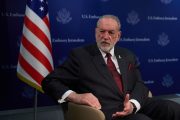
SINGAPORE — Following the onset of the Russo-Ukraine crisis that erupted in February 2022, the United States and its allies severed economic ties with Moscow, enforcing trade sanctions instead. However, Russia managed to deal with these hiccups by maintaining and strengthening its ties with friendly countries, including those from Africa.
According to Russian Foreign Ministry Ambassador-at-Large Oleg Ozerov during a roundtable entitled “International Cooperation Russia-Africa,” Russia has been seeking opportunities for direct trade with African countries amid international isolation due to the Ukraine crisis.
“Since we have been cut off from all opportunities for partnerships by Western countries, we are developing new forms of cooperation. I want to say that the economic collapse in Russia, expected by the West, will not happen. Many companies left, but now they are being displaced by Russian ones. In fact, this contributes to the growth of our economy,” Ozerov pointed out.
He highlighted the advantages of working with African countries, stating that Russia can safely enter African markets for both exports and imports. “Growing demand in Africa can be a catalyst for diversifying domestic exports and increasing the production of highly processed goods,” he noted.
Alluding to the topic of international trade during a recent meeting between Russian President Vladimir Putin and Chinese leader Xi Jinping, Ozerov pointed out that Moscow backs the idea of using the Chinese yuan in trade with African countries. By doing so, Russia and Africa can reduce their dependence on the U.S. dollar, as well as shield African economies that are under U.S.-led sanctions.
Even before the Russo-Ukraine military conflict, Russia had been reinforcing ties with Africa in various fields such as trade, mining, and security. The second Russia-Africa summit, aimed at boosting Russia’s economic ties with African countries, is poised to take place this summer in St. Petersburg, Russia.
Based on a report by Sputnik News, some African countries have expressed interest in joining the BRICS alliance (Brazil, Russia, India, China, and South Africa). For instance, Zimbabwe recently declared that it would like to join BRICS, claiming that the bloc did not have any entrenched ideological doctrines that may undermine interstate cooperation.
Russia has been riled at the United States for “exerting unprecedented pressure” on African countries, such as trying to disrupt the scheduled Russia-Africa summit, Russia’s deputy foreign minister was quoted as saying in February this year.
Deputy Foreign Minister Mikhail Bogdanov, as cited by the Russian news outlet TASS, lambasted the “collective West” for trying to alienate Russia from the world. “The United States and its allies are conducting an unprecedented campaign for the political and economic isolation of Russia, including the disruption of the Russian-Africa second summit in St. Petersburg,” he told the news agency. “Since the beginning of the special military operation, the collective West has significantly increased pressure on African countries — through threats of imposing sanctions [and] termination of financial and humanitarian aid.”
In a recent interview with Sputnik, Rugare Mukanganga, an economist at Development Reimagined, an African-led international development consultancy, echoed Bogdanov’s statements that American efforts to lead Africa away from Russia and China have sidelined African interests. “In a nutshell, they highlighted how African interests often suffer or are made a secondary concern whenever global geopolitical conflicts take place,” Mukanganga said.
Furthermore, he asserted that the United States might not be prepared to “fill the gap China and Russia fill in terms of fulfilling African development and security needs.” Even if the U.S. were prepared to do so, he said, it is questionable whether or not it could succeed, given that African countries have been “at the receiving end of the US’ back and forth tussle with Russia and China.” He suggested that a “more proactive form of engagement as global peers” would be better. At the moment however, there are neither winners nor successes, he posited.
“What isn’t so clear to me is why African governments must be expected to make a set of reforms in order to receive development assistance,” Mukanganga said. “Why isn’t aid being coupled with trade and investment commitments to make the US-West Africa engagement more wholesome and impactful? With talk of extending financial assistance, to some extent I see US efforts as dangling a carrot in front of African countries in the hope that it will sway interest away from China and Russia and towards the US.”
Mukanganga pointed out that Washington’s clout in Africa has declined over the years, since China has ramped up its involvement on the continent and provided several ways of assistance “with relatively lower constraints.”
Russia likewise has been proactively wooing African nations, with Foreign Minister Sergei Lavrov already making several trips to the continent since the start of the Russo-Ukraine conflict.
Regarding Ukraine, Russia’s actions have been facing resistance not only from other countries, but also seemingly from within Russian territory.
On April 2, a pro-Russian military blogger who backed Russian actions in Ukraine, Vladlen Tatarsky, born Maxim Yuryevich Fomin, was murdered while speaking to a crowd in a cafe in St. Petersburg. The National Republican Army (NRA), an underground partisan group of Russian nationals suspected of plotting to violently overthrow Putin’s government, subsequently assumed responsibility for Tatarsky’s murder.
“We organized and carried out an action on April 2, 2023, against a group of Z-activists and personally against the well-known warmonger and war propagandist, war criminal Maxim Fomin, known as Vladlen Tatarsky,” NRA said in a statement posted on the Telegram channel RosPartizan.
The group, which also claimed to be behind the murder of a daughter of Putin’s ally, Russian journalist Darya Dugina, asserted in its statement:
This action was prepared and carried out by us autonomously, and we have no connection and have not received assistance from any foreign structures, let alone special services. This action was carried out in a club owned by one of the most famous Russian gangsters and criminals, Yevgeny Prigozhin. As a result of the action the club will stop its work. We are satisfied with this. The action we carried out was not directed against civilians, and all the victims are among the active supporters of the war, justifying the war crimes of the Putin regime in Ukraine.
Just as with Darya Dugina’s assassination, the group did not offer tangible evidence of their alleged involvement in the attack on Tatarsky, and security specialists have been skeptical of the group’s statements thus far.
Rather, Russia’s Investigative Committee asserted that it has evidence that the Security Service of Ukraine (SBU), with the assistance of imprisoned opposition leader Alexei Navalny’s Anti-Corruption Foundation, was behind Tatarsky’s murder.
Tatarsky, with over 500,000 followers on Telegram, was among the most prominent military bloggers on the Ukraine conflict. Notably, the 44-year-old also urged the Kremlin to adopt a more aggressive strategy, causing some to wonder if the Russian government itself was behind his murder.




